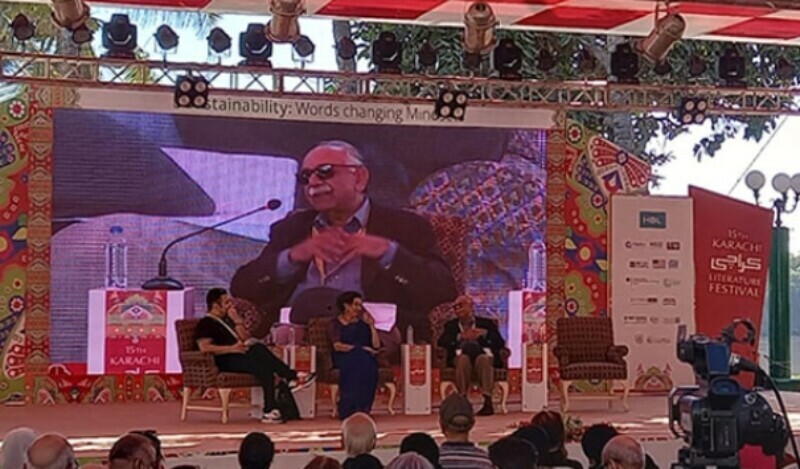KARACHI: Panellists in one of the sessions at the ongoing Karachi Literature Festival (KLF) on Saturday observed that it was imperative to keep the security establishment out of politics in order to make the federation stronger.
They were of the view that this could only be done by putting effective checks and balances.
The panellists — renowned economist Dr Kaiser Bengali, former finance minister Asad Umar, Advocate Faisal Siddiqi and former Federal Board of Revenue chairman Shabbar Zaidi — were speaking at the session — Evolving federation: two steps forward one step back — which was moderated by Amber Rahim Shamsi.
Speaking on the occasion, Asad Umar said everyone, including armed forces chiefs, agreed that the military should have no role in politics but it was not the case in reality and the issue was still not getting solved.
Commenting on the importance of strengthening local governments, he said, “In the narrative of federal evolution, we need to empower local governments…this will have a significant impact on the overall governance and contribute to sustainable progress.”
Shabbar Zaidi says all political parties need to sit together to save Pakistan
“Two steps forward signify our collective progress, while the step back serves as a reminder of the complexities inherent in building a cohesive federation,” he added.
Shabbar Zaidi said that the federation would become strong only when the military’s role in politics would decrease in the country. And that could be done effectively only by rewiring its budget, he added.
He said the National Finance Commission (NFC) award and 18th Amendment had put a check on the military’s budget and expenditures. Federation was strong in books and in written documents but it was the implementation which was lacking, he said.
He added that all political parties needed to sit together if Pakistan was to be saved.
Dr Bengali agreed with Mr Zaidi and said: “We should fight for their [military’s] budget cut.”
He said that the NFC award and 18th Amendment had put an end to the nationalist and separatist movements in Sindh and, thereby, strengthened the federation.
Speaking of political instability, he again referred to the establishment and said that if the ‘big brother’ pulls out his hands, all political stakeholders would sit together and make their own decisions.
Referring to the situation in Balochistan and Khyber Pakhtunkhwa, where an insurgency was continuing for a long time, he said that the entire system in the country was imploding.
He was of the view that the country’s security establishment was responsible for what happening in Balochistan today.
Speaking on the occasion, Advocate Faisal Siddiqi said the real debate, especially after 2008, was the power struggle between de facto power of the establishment and de jure power of the Constitution.
He said certain ‘revolutions’ had taken place in the year 2008, which were “revival of the Constitution, revival of electoral democracy to a certain extent, revival of judiciary and the growth of media”.
He said that the powerful establishment was trying to reverse all those changes and by that, trying to control constitutional democracy.
He said there was Constitution, democracy, media, etc, in the country but their implementation was not being ensured because of the establishment’s control.
He added that it was also because of that very reason that devolution of power was not becoming possible. And if things remained the same, the system would remain ungovernable, he added.
Session on new social contract
Former prime minister Shahid Khaqan Abbasi and former finance minister Miftah Ismail engaged in a powerful session titled ‘Reforming Pakistan: A New Social Contract’.
Their discussion revolved around strategies to promote inclusivity, transparency and accountability in governance, as well as initiatives to enhance access to quality education, healthcare services, and economic opportunities for all segments of society.
The panel identified actionable solutions and pathways towards forging a new social contract that prioritises the well-being and prosperity of all Pakistanis.
A press release issued by the event organisers stated that the KLF continued its journey into the realms of sustainability and the transformative power of words on its second day.
With a diverse line-up of speakers and thought-provoking sessions, the participants were engaged in discussions, book launches, and presentations, aimed at reshaping mindsets for a sustainable future.
Published in Dawn, February 18th, 2024










